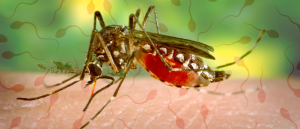
BioTechniques News
Aisha Al-Janabi

The first high-resolution map of proteins in the malaria parasite Plasmodium falciparum (P. falciparum) suggests that the parasite uses decoy proteins to limit our long-term immune response.
Researchers at the University of California San Francisco (UCSF) and the Chan Zuckerberg Biohub Network (both CA, USA) have recently published research characterizing the immune response to P. falciparum, a parasite that causes one of the most dangerous forms of malaria in humans. The results showed that the body most commonly responds to ‘decoy’ proteins produced by the parasite, which means that natural immunity only builds up with repeated exposures and is short-lived. Researchers hope that studying the immune response over time will highlight more effective targets for combating the parasite and potentially lead to a better malaria vaccine.
The complexity of the life cycle of P. falciparum within the body means that it is hard to produce antibodies that provide long-lasting immunity. Even though people living in areas with high malaria transmission can develop natural immunity, the duration of this process means that children are at particular risk of severe disease and death. The immunity is also easily lost with people who leave areas of high transmission more likely to develop malaria on their return.
This challenge of building up a lasting immune response has also hindered efforts to develop a vaccine. RTS,S – the first vaccine to be approved for malaria – requires four doses and is only about 30% effective against developing severe disease and the protection is limited to a few months.
One reason for the gaps in knowledge regarding malaria immunity is that it is hard to assess which of the roughly 5400 proteins that make up the P. falciparum proteome the immune system responds to. In this study, researchers sought to comprehensively assess this by utilizing phage immunoprecipitation sequencing (PhIP-Seq).
 Immobilizing mosquito sperm could be the key to controlling mosquito populations
Immobilizing mosquito sperm could be the key to controlling mosquito populations
Researchers have analyzed proteins in mosquito sperm to find an environmentally friendly approach to managing these insects.
In PhIP-Seq, the researchers first cut the P. falciparum proteome to create a ‘library’ of 238,068 62-amino acid peptides that covered all the known coding regions and engineered bacteria to present them. By mixing these with blood samples from people who have been exposed to malaria, the researchers can identify which of the proteins have previously triggered antibody production. If there has been previous natural exposure to a specific section of protein, the blood sample would show reactivity in the PhIP-Seq system.
For this study, the team collected blood samples from 198 Ugandan children and adults who either lived in areas with extremely high or moderate levels of malaria transmission and compared the response to a control group of American adults who were unlikely to have been exposed to P. falciparum.
The researchers found that the Ugandans’ blood produced antibodies to a range of proteins within the parasite and that the strongest responses were to peptides called ‘repeat elements.’ These sections have many repeats within the amino acid sequences but have little impact on the protein’s function. They also found that the immune response to these sections was highly dependent on exposure to the malaria parasite with blood from children living in extremely high areas of transmission showing twice the reactivity than for children who had moderate exposure. The response to these repeat elements also reduced over time, and reduced more than the response to sections that were not repeat elements.
The authors believe that because the body targets these lower-value ‘decoy proteins,’ there is less chance of immunity building up. First author of the study Madhura Raghava (UCSF) said, “immune resources are limited, and in the case of malaria our bodies seem to be making a major miscalculation in what they’re targeting to create natural immunity.” This may also impact the effectiveness of RTS,S as the vaccine targets a repeat element.
The scientists plan to utilize the new proteome library to assess how the antibody responses change over time and how it varies with other factors such as frequency of exposure. They hope that further data can highlight which specific areas of the parasite’s proteome can trigger a more effective immune response that could form the basis of a more effective vaccine.
Co-senior author Bryan Greenhouse (UCSF) said, “Unfortunately, malaria is simply a normal part of everyday life for many people and immunity is the only thing keeping them from being continually ill or dying. It is critical we keep working to understand that immunity better if we want to have a chance at developing an effective, life-saving vaccine.”
The post Malaria parasite uses decoy proteins to distract the immune system appeared first on BioTechniques.
Full BioTechniques Article here
Powered by WPeMatico
